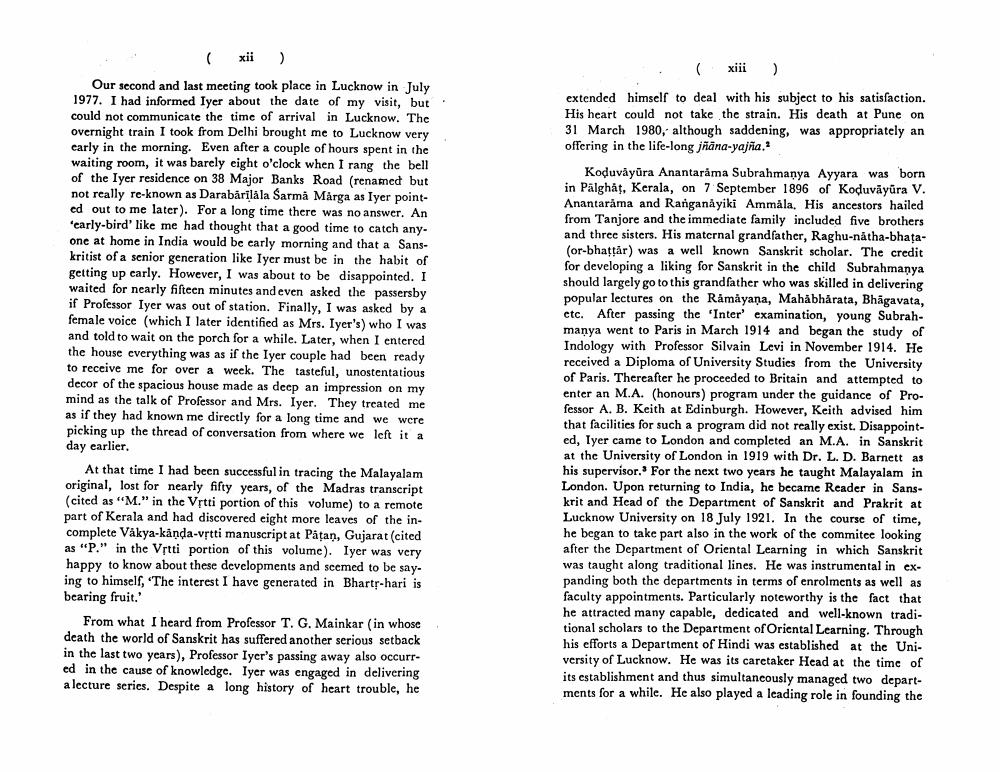Book Title: Foreword Author(s): Ashok Aklujkar Publisher: Ashok Aklujkar View full book textPage 3
________________ (xii) Our second and last meeting took place in Lucknow in July 1977. I had informed Iyer about the date of my visit, but could not communicate the time of arrival in Lucknow. The overnight train I took from Delhi brought me to Lucknow very early in the morning. Even after a couple of hours spent in the waiting room, it was barely eight o'clock when I rang the bell of the Iyer residence on 38 Major Banks Road (renamed but not really re-known as Darabārīlāla Sarmå Mårga as Iyer pointed out to me later). For a long time there was no answer. An 'early-bird' like me had thought that a good time to catch anyone at home in India would be early morning and that a Sanskritist of a senior generation like Iyer must be in the habit of getting up early. However, I was about to be disappointed. I waited for nearly fifteen minutes and even asked the passersby if Professor Iyer was out of station. Finally, I was asked by a female voice (which I later identified as Mrs. Iyer's) who I was and told to wait on the porch for a while. Later, when I entered the house everything was as if the Iyer couple had been ready to receive me for over a week. The tasteful, unostentatious decor of the spacious house made as deep an impression on my mind as the talk of Professor and Mrs. Iyer. They treated me as if they had known me directly for a long time and we were picking up the thread of conversation from where we left it a day earlier. At that time I had been successful in tracing the Malayalam original, lost for nearly fifty years, of the Madras transcript (cited as "M." in the Vṛtti portion of this volume) to a remote part of Kerala and had discovered eight more leaves of the incomplete Väkya-kanda-vṛtti manuscript at Patan, Gujarat (cited as "P." in the Vrtti portion of this volume). Iyer was very happy to know about these developments and seemed to be saying to himself, "The interest I have generated in Bhartṛ-hari is bearing fruit.' From what I heard from Professor T. G. Mainkar (in whose death the world of Sanskrit has suffered another serious setback in the last two years), Professor Iyer's passing away also occurred in the cause of knowledge. Iyer was engaged in delivering a lecture series. Despite a long history of heart trouble, he (xiii) extended himself to deal with his subject to his satisfaction. His heart could not take the strain. His death at Pune on 31 March 1980, although saddening, was appropriately an offering in the life-long jñāna-yajña. Koduvayura Anantaráma Subrahmanya Ayyara was born in Palghat, Kerala, on 7 September 1896 of Koduväyūra V. Anantarama and Ranganâyiki Ammála. His ancestors hailed from Tanjore and the immediate family included five brothers and three sisters. His maternal grandfather, Raghu-natha-bhața(or-bhaṭṭar) was a well known Sanskrit scholar. The credit for developing a liking for Sanskrit in the child Subrahmanya should largely go to this grandfather who was skilled in delivering popular lectures on the Ramayana, Mahābhārata, Bhāgavata, etc. After passing the 'Inter' examination, young Subrahmanya went to Paris in March 1914 and began the study of Indology with Professor Silvain Levi in November 1914. He received a Diploma of University Studies from the University of Paris. Thereafter he proceeded to Britain and attempted to enter an M.A. (honours) program under the guidance of Professor A. B. Keith at Edinburgh. However, Keith advised him that facilities for such a program did not really exist. Disappointed, Iyer came to London and completed an M.A. in Sanskrit at the University of London in 1919 with Dr. L. D. Barnett as his supervisor. For the next two years he taught Malayalam in London. Upon returning to India, he became Reader in Sanskrit and Head of the Department of Sanskrit and Prakrit at Lucknow University on 18 July 1921. In the course of time, he began to take part also in the work of the commitee looking after the Department of Oriental Learning in which Sanskrit was taught along traditional lines. He was instrumental in expanding both the departments in terms of enrolments as well as faculty appointments. Particularly noteworthy is the fact that he attracted many capable, dedicated and well-known traditional scholars to the Department of Oriental Learning. Through his efforts a Department of Hindi was established at the University of Lucknow. He was its caretaker Head at the time of its establishment and thus simultaneously managed two departments for a while. He also played a leading role in founding thePage Navigation
1 2 3 4 5 6
